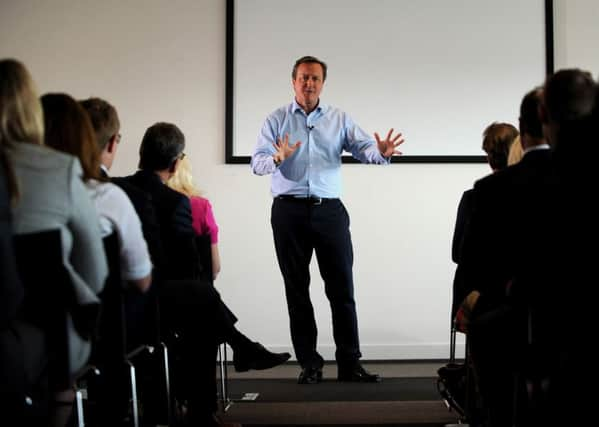YP Comment: Cameron: '˜I'm not a gloomster'. PM evokes Churchill maxim


“I’m not a gloomster,” he told his audience before explaining, for example, how his onerous responsibilities as Prime Minister had given him new insight into the European Union’s critical role when it comes to security matters.
Quoting Winston Churchill’s view that “we are with Europe but not of it”, Mr Cameron was even more forthright when it came to jobs and the economy before giving three detailed reasons why a Remain vote is in the best interests of Yorkshire’s farmers.
Advertisement
Hide AdAdvertisement
Hide AdPassionate and animated, while respectful of those questioners who believe that he will struggle to heal Tory party wounds, this positive interaction between politicians and voters is more constructive than the campaign’s back-biting and name-calling thus far.
Significantly, Mr Cameron chose not to name-check any of his opponents – perhaps it was a tacit acceptance that there does need to be a change of tone in order to win over the undecided.
Mr Cameron’s visit came on an energetic day of campaigning which saw two former premiers, Sir John Major and Tony Blair, make a joint visit to Northern Ireland to highlight the importance of the whole of the UK remaining in the EU.
There was none of the enmity which characterised their relationship in the 1990s when they were political adversaries, because the leadership of both was critical to the peace process and they do not want the hard-won peace compromised.
Advertisement
Hide AdAdvertisement
Hide AdIf only politics was always this consensual, as uncommitted voters wonder what to make of such shows of unity while struggling to make sense of the claims and counter-claims as they are reminded of Benjamin Disraeli’s timeless “lies, damned lies and statistics” maxim.
Indeed, the difficulties of separating fact from fiction were exemplified by Tory MP Sarah Woollaston. A respected GP before entering Parliament, she has defected to the Remain campaign after disowning the Leave side’s central claim that Brexit would generate an extra £350m a week for the NHS.
If someone as experienced as the chairman of the Health Select Committee is finding it difficult to make sense of the arguments, it’s little wonder that the electorate is struggling to come to terms with the most important political decision that they’re likely to face for a generation. This is why the referendum will be won by the side which puts forward the most convincing and credible arguments. Mr Cameron has put the Remain case to the people of Yorkshire. It’s now up to his opponents to respond with their own clarity of purpose and conviction.